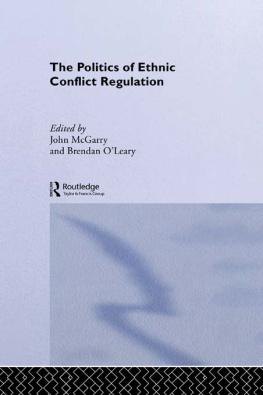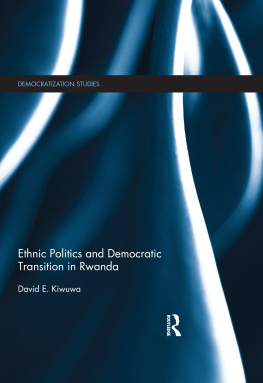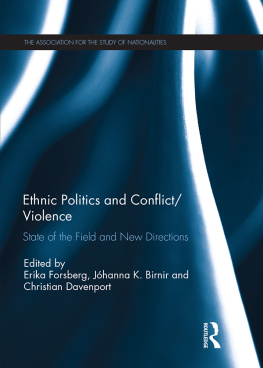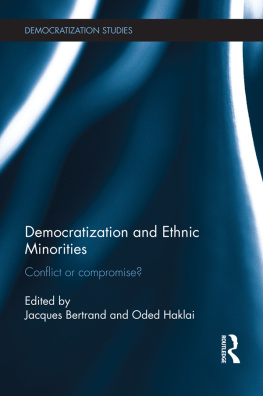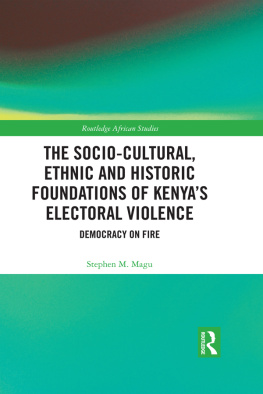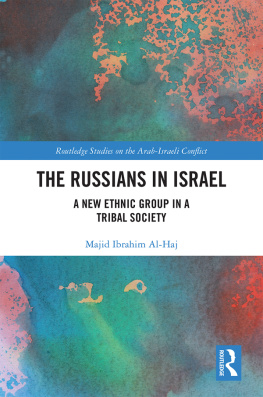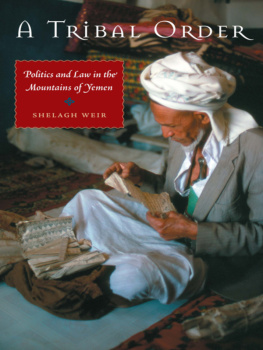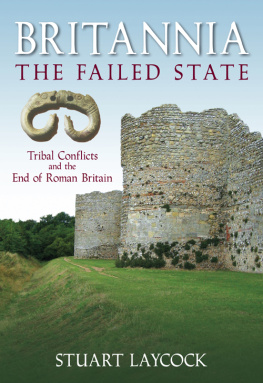First Published in 1998
by Curzon Press
Published 2016 by Routledge
2 Park Square, Milton Park, Abingdon, Oxon OX14 4RN
711 Third Avenue, New York, NY 10017, USA
Routledge is an imprint of the Taylor & Francis Group, an informa business
Editorial Matter 1998 Kenneth Christie
Typeset in Sabon by LaserScript Ltd, Mitcham, Surrey
All rights reserved. No part of this book may be reprinted or reproduced or utilised in any form or by any electronic, mechanical, or other means, now known or hereafter invented, including photocopying and recording, or in any information storage or retrieval system, without permission in writing from the publishers.
British Library Cataloguing in Publication Data
A catalogue record of this book is available from the British Library
Library of Congress Cataloguing in Publication Data
A catalog record for this book has been requested
ISBN 13: 978-0-7007-1118-5 (pbk)
Chapter One
Introduction: The Problem with Ethnicity and Tribal Politics
Kenneth Christie
It was the former French President, Francois Mitterand who drew some of our attention to the ethnic, tribal threat to a civilised Western Europe in a conference in 1992 entitled LEurope et les tribus. He saw a picture of a problematic post-Maastricht vision of Europe, a Community surrounded by barbaric sentiments occupying the peripheral space of European frontiers. The imagery was startling; hostile tribes driven by ancient feudal ties and primitive allegiances were threatening the integrity of the European integration project. While one region of Europe appeared to be descending into the primeval sludge, another was paradoxically ascending the heights of supra-nationalism.
Previously and in other contexts, experts in various fields had located tribal and ethnic conflict in less developed regions of the globe; Africa, Asia, perhaps Latin America. Suddenly, and with great alacrity, the post cold war period had erupted into unprecedented ethnic violence in central and eastern Europe, prompting connotations of tribalism in previously communist states. It also appeared most vociferously in a federal state known most notably for its relaxed and democratic attitudes and policies of non-alignment; Yugoslavia. The world will not soon forget the horrific process of ethnic cleansing entailing the creation of homogeneous populations by means of mass exile; here more than two million people were removed from areas in which for most of the time they classified as minorities.
Despite the end of the cold war and the promise of a New World Order which would produce peace, stability and harmony on a global basis, liberal democrats have been severely disappointed. An end to history vis-avis a Fukuyamanian type analysis has not materialised; rather a return to history in the form of often genocidal ethnic conflict from Burundi to Burma has proved to be one of the most salient and disturbing agendas of the 1990s.
Ethnic unrest and communal strife proved fairly resilient in the Third World but also in developed societies during the 20th century. Why are such conflicts so important? One reason is that this type of conflict has produced more abject misery and loss of life than any other in the post second world war period. As Freeman has argued Tribes, states and empires are all agents of war (Freeman, 1993: p. 27).
In a speech on the 9th of November 1993, Boutros Boutros Ghali, the Secretary-General of the United nations warned that global security was under threat because of the spread of ethnic conflicts in the post cold war period. He noted that since World War II there had been 127 wars most of them for ethnic reasons and made the point that borders and oceans could no longer insulate societies from the implications of this type of violence. And this is particularly so as ethnic groups do not necessarily align themselves with state borders.
New concepts concerning security in the post-cold war period also started to focus less and less on the idea of an enemy and the idea that there is a military threat (particularly in Europe for instance), and more and more on the intangible, soft threats to security. These include areas such as the changing boundaries, race and ethnicity, mass migration, the question of national minorities, the question of Islam, Aids, and religion amongst others. And these threatening problems exist not only at certain national levels but on a global scale.
They are difficult to deal with because many politicians see them as unsolvable; they dont fit neatly into the political structure. And they represent dark underlying forces and currents threatening to disrupt and perhaps dismember the status quo. They are questions apparently without answers because they are seen as complicated and irrational. In short they are highly problematic. Boundaries are constantly in a state of flux in the wake of the Cold War. Yugoslavia, all of Eastern Europe, Russia and the CIS are just a few of the areas on the European continent that have been affected by the traumatic events following the end of the Cold war.
The changes to the world political map are greater now than at any other period in the 20th century with the exceptions of the two world wars and their immediate aftermath. The collapse of Communism as a system of rule in the Soviet Union and Eastern Europe has had enormous consequences for those areas and the rest of the world as well. In the former communist ruled systems, pre-communist attitudes, values, fears and hatreds have resurfaced with a vengeance. Chief amongst these factors is the resurgence of ethnic violence and extreme nationalistic tendencies. The increasingly fragmented societies of the Eurasian continent in turn have added another dimension to the ethnic animosities and strife already evident in the Middle east, parts of Asia (e.g. Indonesia and East Timor), Somalia, much of Sub-Saharan Africa and Cyprus.
Serious analysis of this phenomenon, its causes and consequences, is important and much needed in the new global disorder. Analysts and commentators alike are concerned with the need to explain the sources of ethnic conflict, as well as its policy consequences. Even in established political systems, based in long-standing industrial democracies, separatism and regionalism are becoming more pronounced; examples are the United Kingdom, France and Spain. In these countries, important elements of the population now focus on their immediate localities and regions as political benchmarks, and they emphasize their local heritage in history, music, the arts and other cultural expressions. This is not a new phenomenon, but it appears to be more urgently expressed as the 20th century draws to a close. The drive for nation-building and the construction of regional entities, a dominant theme in much of the world for many decades (in the West, several centuries) is being overshadowed by a quest for smaller, more manageable, political and cultural units.



